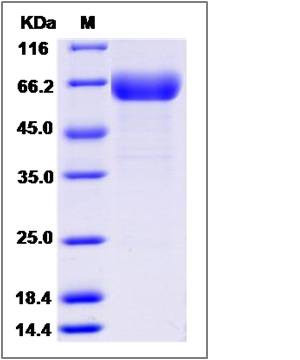Rat B7-H3 / CD276 Protein (Fc Tag)
CD276, B7h3
- 100ug (NPP3104) Please inquiry
| Catalog Number | P80380-R02H |
|---|---|
| Organism Species | Rat |
| Host | Human Cells |
| Synonyms | CD276, B7h3 |
| Molecular Weight | The recombinant rat CD276/Fc is a disulfide-linked homodimer. The reduced monomer comprises 457 amino acids and has a predicted molecular mass of 50.6 kDa. The apparent molecular mass of the protein is approximately 61 kDa in SDS-PAGE under reducing conditions due to glycosylation. |
| predicted N | Val 29 |
| SDS-PAGE |  |
| Purity | > 85 % as determined by SDS-PAGE |
| Protein Construction | A DNA sequence encoding the rat CD276 (Q7TPB4) (Met1-Phe244) was expressed with the Fc region of human IgG1 at the C-terminus. |
| Bio-activity | |
| Research Area | Immunology |Adaptive Immunity |Costimulation & Costimulatory Molecule |B7/CD28 Family |
| Formulation | Lyophilized from sterile PBS, pH 7.4. 1. Normally 5 % - 8 % trehalose and mannitol are added as protectants before lyophilization. Specific concentrations are included in the hardcopy of COA. |
| Background | B7-H3 is a member of the B7 family of immune regulatory ligands that is thought to attenuate peripheral immune responses through co-inhibition. It plays an important role in adaptive immune responses, and was shown to either promote or inhibit T-cell responses in various experimental systems. B7-H3 may play an important role in muscle-immune interactions, providing further evidence of the active role of muscle cells in local immunoregulatory processes. B7-H3 is a novel protein structurally related to the B7 family of ligands by the presence of a single set of immunoglobulin-V-like and immunoglobulin-C-like (VC) domains. Previous studies have correlated its overexpression with poor prognosis and decreased tumor-infiltrating lymphocytes in various carcinomas including uterine endometrioid carcinomas, and mounting evidence supports an immuno-inhibitory role in ovarian cancer prognosis. Recently, B7-H3 expression has been reported in several human cancers indicating an additional function of B7-H3 as a regulator of antitumor immunity. |
| Reference |
